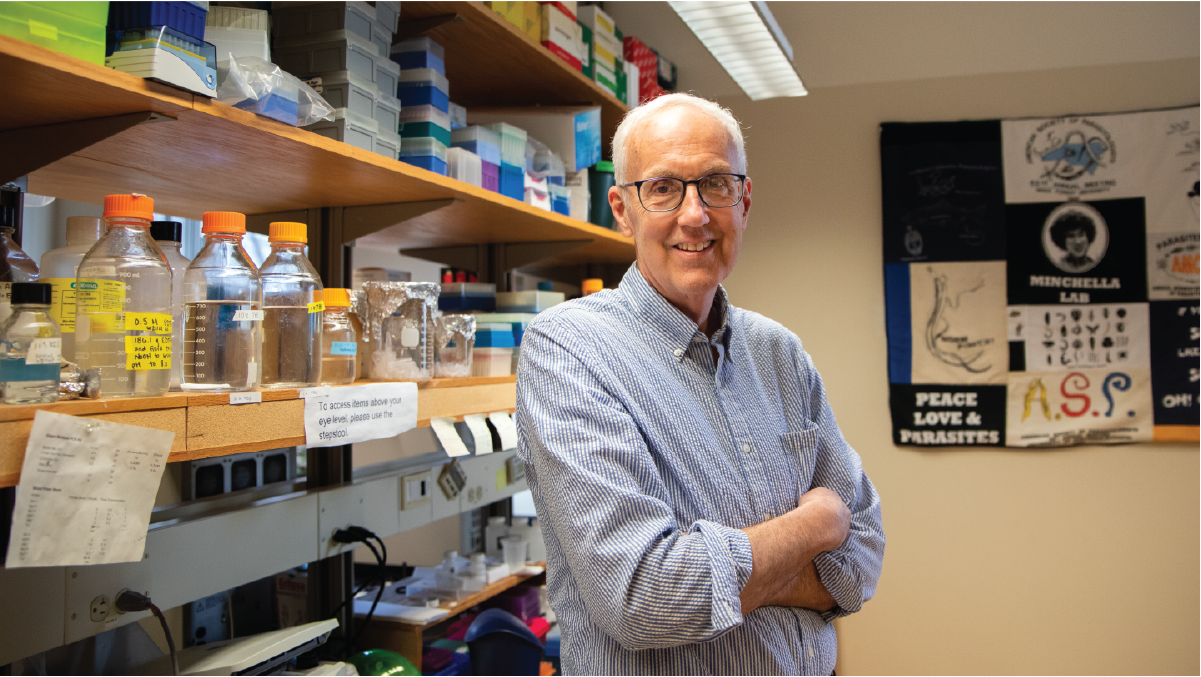Peace, Love, and Parasites: The Enduring Legacy of Dennis Minchella
02-22-2024

Dennis Minchella's journey at Purdue University began with a Greyhound bus ride from Rochester, New York, armed with little more than a suitcase and a vision. A first-generation college student, Minchella's early days at Purdue were marked by uncertainty and challenges. Despite the initial setback of arriving and finding out that his intended graduate research mentor had left the university, Minchella eventually found his place and made significant contributions to the academic community.
Throughout his five-decade tenure at Purdue, Minchella has embodied the spirit of mentorship and guidance. His own experiences as a first-generation college student have uniquely equipped him to connect with students facing similar challenges. Recognizing the anxieties and uncertainties that often accompany the transition to university life, Minchella has become a steadfast source of support for countless students.
As a professor, Minchella has impacted the lives of over 18,000 students through his innovative introductory biology courses. Beyond imparting knowledge, he endeavors to foster critical thinking and problem-solving skills essential for success in academia and beyond. Drawing from his own journey, Minchella encourages students to embrace challenges and become adept puzzle solvers rather than mere memorizers of facts.
Minchella's approach to teaching extends far beyond the confines of the classroom. He creates an inclusive and engaging environment where students feel valued and supported. By infusing humor and relevance into his lectures, he transforms large enrollment classes into intimate learning communities. Using classic rock song themed lectures, ethics problems on homework sets, and relatable examples ranging from cancer to climate change, Minchella sparks curiosity and excitement about the living world.
A testament to Minchella's impact is the rapport he shares with his students. His genuine concern for their well-being and success resonates deeply, fostering a sense of belonging and camaraderie. Students find solace in knowing that Minchella is not just their professor but also their advocate and ally in navigating the complexities of higher education.
In addition to his role as a professor, Minchella has served as the Associate Dean for Undergraduate Education in the College of Science for 13 years. His dedication to academic excellence extends beyond the classroom, shaping policies and initiatives aimed at enhancing the student experience and fostering a culture of innovation and inclusivity. He scaled up his efforts to facilitate student success by leading the development of an array of college-wide initiatives including first-year seminars, sharing meals with instructors, and an evening science help center.
Beyond teaching and administration, Minchella's research on host-parasite interactions garnered acclaim within the scientific community. For instance, his view that infected hosts may vary their life history to minimize the negative impact of parasitic infections grew from the discovery of a phenomenon that he termed "fecundity compensation", wherein parasitized snails exhibit increased early reproduction before succumbing to sterilization. This idea has illuminated new avenues of inquiry in evolutionary biology and parasitology.
Despite his numerous accomplishments, Minchella remains grounded and approachable, embodying the ethos of Purdue's inclusive community. His dedication to mentoring extends beyond the confines of academia, as evidenced by the countless lives he has touched and transformed. He and his past undergraduate and graduate students often share professional and personal successes and challenges.
In his office, Minchella proudly displays a photo from the 1970s, capturing him with an unmistakable afro. Little did he know that this photo would become a symbol of his students' affection and admiration. His students surprised him by creating t-shirts featuring the iconic image, adorned with the words "Peace, Love, and Parasites." The gesture spoke volumes about the profound impact Minchella had made on his students. During a lab meeting, he was greeted by a sea of smiles as his students proudly wore the shirts, a testament to the deep connection and mutual respect shared between Minchella and those he mentors. To this day, each of his graduate students receives one of those t-shirts.
In the ever-evolving landscape of higher education, Dennis Minchella stands as a beacon of inspiration and mentorship. His unwavering commitment to student success, scholarly excellence, and administrative leadership exemplifies the very best of Purdue's academic tradition, leaving an enduring legacy for generations to come.
About the Department of Biological Sciences at Purdue University
Purdue Biological Sciences is the largest department in the Life Sciences at Purdue University. We are dedicated to pioneering scientific discoveries and transformative education at the cutting edge of innovation. From molecules to cells, from tissues to organisms, from populations to ecosystems - we bring together multiple perspectives, integrating across biological scales to advance our understanding of life and tackle the world’s most pressing challenges. Learn more at bio.purdue.edu/.
Writer – Alisha Referda, Communications Specialist